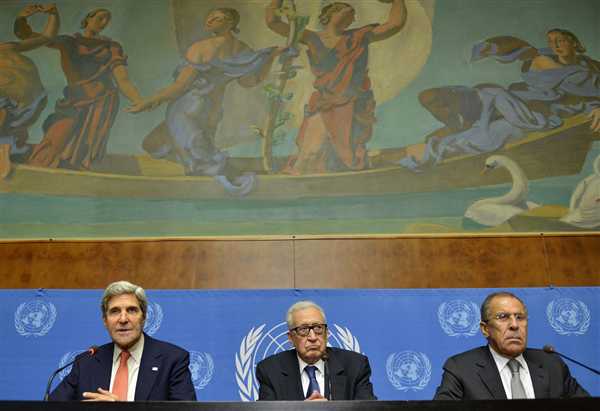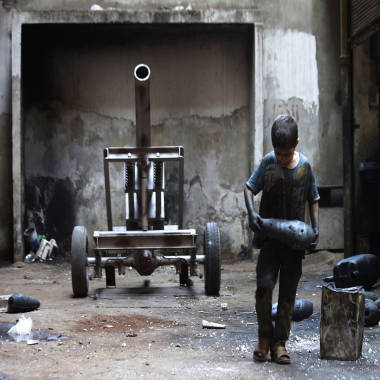
Martial Trezzini / Keystone via EPA
Secretary of State John Kerry, U.N.-Arab League envoy for Syria Lakhdar Brahimi and Russian Foreign Minister Sergei Lavrov hold a news conference in Geneva on Friday.
Condemning the “specter of chemical weapons warfare,” U.N. Secretary-General Ban Ki-moon said Friday that it would be an “atrocious violation of international law” if a report by U.N. experts confirms the use of poison gas in an Aug. 21 attack that killed hundreds of civilians.
“I believe that the report will be an overwhelming, overwhelming report that chemical weapons (were) used even though I cannot publicly say at this time before I receive this report,” Ban said at a U.N. meeting.
Stopping short of holding Syrian President Bashar Assad liable for the chemical weapons attack, Ban blamed the ongoing bloody conflict for “rising sectarian tensions, regional instability and the largest displacement of a people in a generation.”
Meanwhile, in Geneva, Secretary of State John Kerry called talks with Russia on Syria’s chemical weapons “constructive” and said he hoped the negotiations would help restart plans for a new conference to end the country’s civil war.
Sitting alongside Russian counterpart Sergey Lavrov and U.N.-Arab League envoy for Syria Lakhdar Brahimi, Kerry said they had “agreed to do that homework and meet again in New York” around Sept. 28.
Lavrov said the longer term goal of the current talks was to find a “peaceful resolution” to the conflict, and said work on chemical weapons would occur alongside preparations for a new peace conference, which would be known as Geneva 2.
Lavrov’s spokeswoman said the negotiations will continue on Friday night and likely through the night in search of a deal, Reuters reported.
The talks in Geneva are intended to hammer out plans for Assad’s government to hand over its chemical weapons and thus avoid U.S. strikes.
Kerry said the chances for a second peace conference “will obviously depend on the capacity to have success here … on the subject of the chemical weapons.”
While meeting with Amir Sabah Al-Sabah of Kuwait President Obama says that both countries agree that the use of chemical weapons in Syria was a “criminal act” and that “it is absolutely important for the international community to respond in not only deterring repeated use of chemical weapons but hopefully getting those chemical weapons outside of Syria.”
He was scheduled to meet with former U.N. Secretary-General Kofi Annan in the afternoon, a senior state department official said. Monday, French Foreign Minister Laurent Fabius, Kerry and British Foreign Secretary William Hague are also expected to meet in Paris to further discuss Syria.
On Thursday, Kerry rejected Assad’s reported desire for a standard 30 days to submit information about its chemical stockpile after it signed up to the global anti-chemical weapons treaty.
“This is not a game,” he said. “It has to be real. It has to be comprehensive. It has to be verifiable. It has to be credible. It has to be timely and implemented in a timely fashion. And finally there ought to be consequences if it doesn’t take place.”
NBC’s Ayman Mohyeldin interviewed the Syrian Ambassador to Lebanon, Ali Abdul Karim Ali, about Syria’s willingness to come to the negotiating table and give up chemical weapons at the Syrian Embassy in Beirut on Friday. He said Syria was “serious” about the talks.
“Syria considers the dangers the region faces, as well as the world, are [from] weapons of mass destruction; and foremost among them, nuclear weapons. Because of that, for 20 years Syria has proposed ridding the entire region of all weapons of mass destruction, nuclear weapons, biological and chemical and proposed it to the UN. This is not hidden.”
The ambassador said that “Syria is serious about the issue and ready to negotiate when we see the positive benefit of avoiding an explosion.” He added that Syria’s interests are in “stopping the bloodshed of the Syrian people.”
Meanwhile, U.N. war crimes investigators accused forces loyal to Assad of preventing the sick and wounded from receiving medical care.
The damning report said Syrian forces had waged a campaign using “the denial of medical care as a weapon of war,” especially against people living in opposition-controlled areas, according to the independent inquiry led by Brazilian expert Paulo Pinheiro. The report also accused Assad’s forces of attacking field hospitals with fighter jets.
“There is also evidence that some anti-government armed groups have attacked hospitals in certain areas,” it said.
The U.N. war crimes report followed a string of evidence pointing to atrocities international observers were blaming largely on Assad’s forces. Earlier Friday, Human Rights Watch said Syrian government forces and pro-regime militias in May summarily executed at least 248 men, women and children in one of the deadliest attacks since the start of the conflict in 2011.
Tens of thousands have already lost their lives in the bloody conflict between forces loyal to Assad and those opposed to his rule, forcing more than 2 million people to flee across Syria’s borders.
NBC’s Ayman Mohyeldin, Charlene Gubash, Reuters and The Associated Press contributed to this report.
